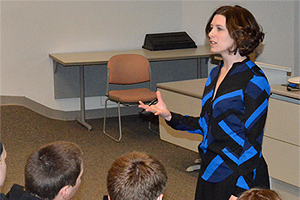Dr. Laurie Miller, assistant professor of practice in economics at the University of Nebraska–Lincoln College of Business Administration, recently had her paper “Caregivers, Firm Policies and Gender Discrimination Claims,” published in the
Review of Economics of the Household. The paper follows on the heels of her first accepted publication “Teams, Wages and Wage Dispersion,” which will appear in the
International Journal of Manpower.
Both publications have spun off Miller’s doctoral dissertation work in labor economics which is at the heart of her research interest.
“A lot of the work in my dissertation is about the consequences of schedule flexibilities,” Miller said. “I’m interested in flexibilities because it has an opportunity to benefit workers and firms.”
In 2007, the Equal Employment Opportunity Commission made it possible to claim caregiver discrimination as a type of gender discrimination. Miller’s research asked subjects if they felt they were discriminated against at their job because of their family care giving responsibilities.
“We were the first ones to look at this,” she said. “We were trying to identify what types of worker and firm characteristics are associated with claims of caregiver discrimination and gender discrimination. The big take away we found was women with greater work-family conflict are more likely to report both caregiver and gender discrimination.”

Laurie Miller teaching economics at CBA
She found employers who have formal workplace policies in place related to caregiving, generally have a decreased probability of claims.
“We found two formal policies that were associated with reduced claims of caregiver discrimination,” Miller said. “Working from home and the ability to rearrange your schedule to take care of family responsibilities were both shown to be important policy factors.”
Miller believes the practical benefits of her research on societal workplace dynamics are becoming more important.
“What we’re increasingly learning with regard to caregiving is that it also has implications for eldercare,” she said. “President Obama held the Flexibility Summit in 2010, because schedule flexibility and work-family conflict are such a big topic and it affects a lot of people.”
Dr. Scott Fuess, Karl H. Nelson Professor of Economics and Department Chair of Economics at CBA, noted the early impact Miller has already made in her academic career.
“The
International Journal of Manpower in particular is a respected outlet for labor economists,” Fuess said. “It’s always rewarding to achieve a publication and Laurie has made a great start here at the college.”
Miller came to CBA last fall after receiving her Ph.D. from the University of Wisconsin-Milwaukee. A third paper “Workplace Flexibilities, Job Satisfaction and Union Membership in the U.S. Workforce,” is forthcoming in the
British Journal of Industrial Relations.
Published: May 15, 2013